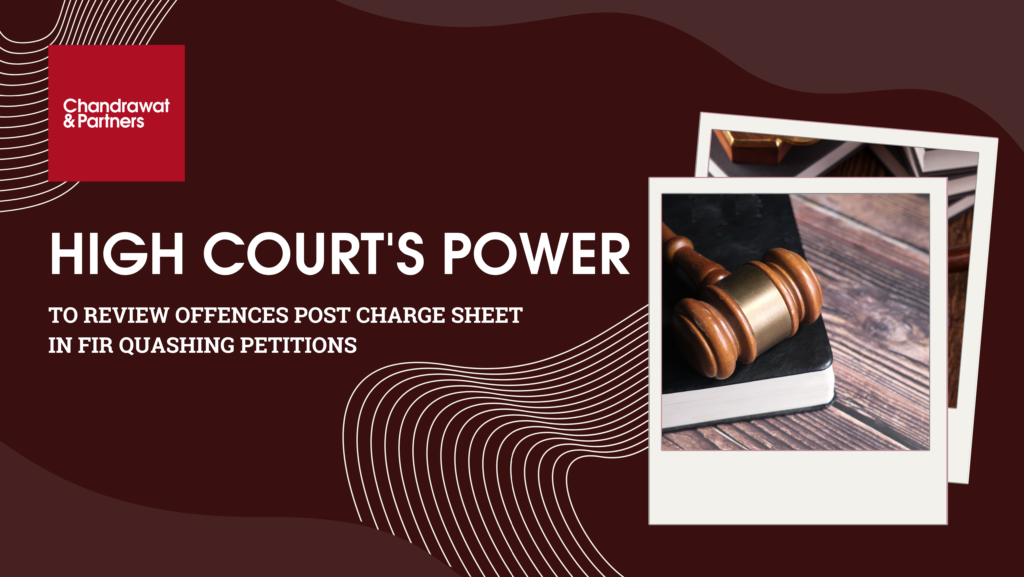Share :
Introduction
The High Court is not prohibited from exercising its inherent jurisdiction and could still determine whether or not the crimes claimed to have been committed were made out in the first place based on the First Information Report (“FIR”), charge sheet, and other documents if the charge sheet is filed against the accused while the petition to quash the FIR is pending. According to a Coordinate Bench of this Court, based on the FIR, charge sheet, and other documents, the Court may still determine whether or not the offences claimed to have been committed were prima facie made out. This is even in the case where the charge sheet had been issued.
FACTS OF THE CASES
The case in question involved an appellant-accused who filed a petition under Section 482 of the Code of Criminal Procedure, (“CrPC”) 1973, the appellant-accused in this case has filed an appeal to dismiss an FIR that was filed against him for allegedly committing offences covered by Sections 420 and 409 of the Indian Penal Code 1860, (“IPC”).
The High Court noted the matter, dismissed the petition as unfounded, and ordered the accused to appear in person before the relevant court. The charge sheet was filed after the filing of the quashing petition, which is why the High Court rejected the quashing plea. The criminal writ petition had become infructuous, according to the ruling of the High Court in this instance.
SUPREME COURT ANALYSIS
In the case of Mamta Shailesh Chandra Vs. State Of Uttarakhand & Ors. the Supreme Court passed the order on 29th Jan 2024 with the Bench of Justices Aniruddha Bose and Justice Sanjay Kumar emphasising that the court could still examine the prima facie nature of alleged offences based on the FIR, charge sheet, and other documents. This ruling reaffirms the principle established in the 2011 refer case of Joseph Salvaraj A. vs. State of Gujarat & Ors. where a Coordinate Bench opined on the same matter. Criminal breach of trust is defined under Section 405 IPC, 1860 and Section 406 IPC, 1860 there of deals with punishment to be awarded to the accused if found guilty of commission of the said offence i.e. with imprisonment for a term which may extend to three years, or with fine, or with both. At the same time, Section 420 of the IPC,1860 deals with cheating and dishonestly inducing the delivery of property. Cheating has been defined under Section 415 of the IPC, 1860. To constitute an offence. Under the aforesaid section, it is inbuilt that there has to be a dishonest intention from the very beginning, which is sine qua non to hold the accused guilty for the commission of the said offence. Categorical and microscopic examination of the FIR certainly does not reflect any such dishonest intention ab initio on the part of the appellant.
ANALYSIS OF LAW
The accused-appellant challenged the decision to the Supreme Court, which disagreed with the High Court’s reasoning. Considering the Joseph Salvaraj case as precedent, the Supreme Court said, “We do not agree with the reasoning of the High Court for dismissing the writ petition, having regard to the ratio of the judgment delivered on 04.07.2011 in Joseph Salvaraj A. vs. State of Gujarat & Ors.” This ruling supports the theory that the court may still examine the case’s merits using the information with reference even if a charge sheet is only filed after a quashing petition has been initiated. It is an important step towards guaranteeing a fair and adequate legal process for anyone who wants to get their complaints dismissed by quashing FIRs. As a result, it is clear from the general context of the several provisions under which the appellant is accused and may face prosecution that the allegations are not supported, even on the surface, by the complaint’s FIR. The learned Single Judge might have investigated whether or not the offences the appellant was accused of committing were prima facie established by the complainant’s FIR, charge sheet, documents, etc., even if the charge sheet had been submitted.
The Court held that the money deposited with the appellant could not be said to be an entrustment. In any case, the remedy was available in a civil court if there was a misappropriation. In the opinion of the Court, the FIR filed under Section 406 IPC, 1860 was not tenable and therefore it was quashed. The appeal was thus allowed and the Judgement was set aside.
CONCLUSION
In our opinion, the matter appears to be purely civil. There appears to be no cheating or dishonest inducement for the delivery of property or breach of trust by the Appellant. The present FIR is an abuse of the process of law. This is purely a civil nature case and is requested to be granted the status of a criminal crime to exact vengeance on the appellant. It does not meet the rigorous level of proof necessary to support a criminal charge. Therefore, after considering all relevant factors, we have concluded that prosecuting the appellant for the claimed offences would constitute a blatant misuse of the legal system.
For more information or queries, please email us at
enquiries@chandrawatpartners.com




